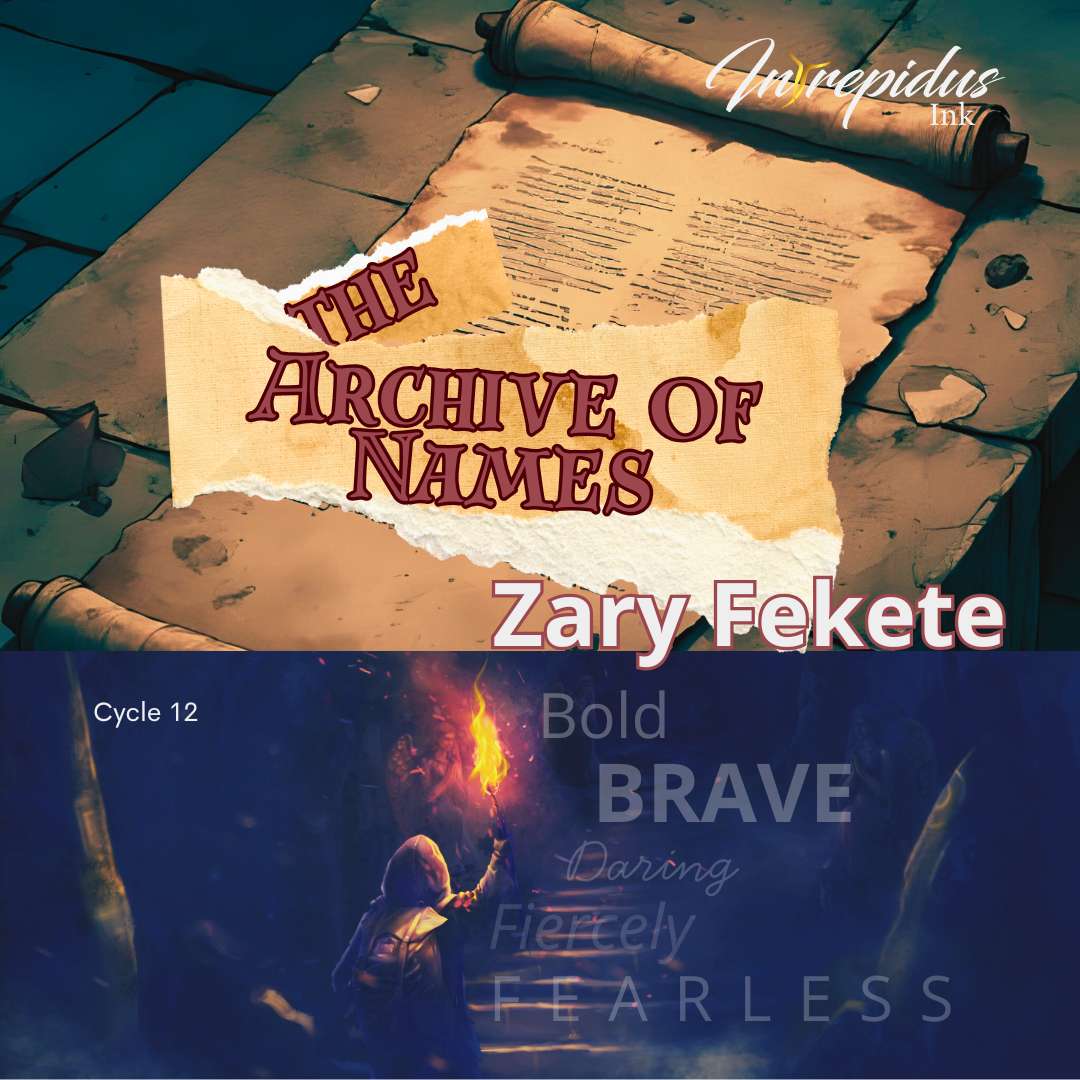

Speculative Fiction
“…Travellers ne’er did lie,
though fools at home condemn them.”
(William Shakespeare: The Tempest; Act 3, Scene 3)
D
aphne and Ari pulled up at the recharging station next to Conway Convenience Store. She said, “While you charge her up, I’ll pop in for an iced peppermint cone. D’ya want one?”
“You paying?”
“I’m paying.”
“I want one.”
She selected the cones from the freezer before enduring the usual altercation with the automatic check-out. It accepted her fingerprint on the sixth attempt. Typical twenty-third century aggravation.
She emerged to find the forecourt deserted: no car, no boyfriend, nothing but one of the homeless horde curled up in the store’s doorway.
She looked around. “What happened?”
Homeless said, “The slavers took your feller.”
“Took him where?”
“I heard them muttering about the mines on planet Nyx. If you won’t be wanting both of those cones, I wouldn’t mind taking one off your hands.”
“Take them both. I’ve lost my appetite.”
He grabbed them. “You’re a good’n.”
Her head spun. Nyx. Dwarf planet at the edge of the solar system. Discovered a hundred years ago. Weird black surface giving off no light, made it hard to find. Named after the goddess of night. Scary.
She fought back tears. No time for that. She had to rescue Ari. Where to start? Think, Daphne, think. They’re going off planet. They’ll head for the transporter station on Puffin Island after boarding the ferry at the docks. The freeway on which she stood would take her there. She needed a lift.
The thought had barely coalesced when an open-trailer delivery truck streaked past, no doubt to collect container-boat cargo. Damn. That would have been perfect. She watched as it sped away, then pulled onto the hard shoulder and stopped. She started running. The driver jumped from the cab and darted into the roadside hedge, probably for a comfort break. She had to reach the truck before he completed the operation. Gasping for breath, she prayed he had a full bladder.
He emerged from the foliage and climbed back into the cab. She was only feet away when the engine started. She lurched forward, grabbing the back of the trailer. A hand reached out from a stack of sacks and encircled her wrist. A second hand grasped her other wrist. She was hauled on board and confronted by a young man with a wide grin and a mass of untidy curls.
He said, “You cut that fine, girl.”
“I know. Thanks for the helping hands.”
“You’re welcome. Where are you heading?”
“The docks. I have to reach the transporter station to rescue someone the slavers are taking to the Nyx mines.”
“How you gonna do that?”
“No idea, but I’ll think of something.”
“What’s your name?”
“Daphne.”
“Sweet. Greek mythology, yeah?”
“Yes. She was a nymph.”
He grinned. “Interesting.”
She gave him her no-nonsense glare. “Don’t get any funny ideas. The last time some joker pushed his luck, I kicked him in the how-goes-its and broke his nose.”
“Must have been a helluva kick.”
She frowned. “What? Oh no, after the kick, I hit him with a chair. That’s what broke his nose. No harm done. He could afford cosmetic surgery.”
“Well, I won’t be expecting any home comforts, so be gentle with me. Deal?” He offered his hand.
She shook it. “Deal. What’s your name?”
“Rab.”
“Where are you going?”
“Anywhere I like. I’m a piece of driftwood.”
“The people of the road?”
He nodded. “There are millions of us, and the number’s growing. We want no part of what’s happening in this country. It’s broken, and nobody’s trying to fix it. The politicians promise reform, but they lie. There’s no room for lies out on the road.”
“So you just drift?”
“For now. Maybe I’ll take time to help you save whoever it is from the slavers.”
“His name’s Ari. Why would you help me?”
He shrugged. “Nothing better to do. I’m guessing he’s not the one with the broken nose and the aching…”
“No, he’s not,” she interrupted. “He’s my boyfriend.”
He grinned. “Home comforts?”
“Mind your own business.”
He laughed. She laughed, too. It was ridiculous. In a situation like this, she shouldn’t be laughing.
They reached the docks and jumped down from the truck. The ferry stood at the dockside. Rab said, “They’ll be on board now, but they won’t sail until dawn.”
He led her to a secluded corner of the parking area where they had a good view of the ferry. “Wait here. There’s something we need.” He disappeared into a building with a Staff Only sign on the door, emerging a few minutes later wearing a yellow anorak. He was carrying another one and two clipboards. He handed her the anorak. “Put this on and carry the clipboard. Nobody will give you a second glance. You’ll blend into the background. It’s been like that for centuries. Some things don’t change.”
She pointed to one of the parked cars. “That’s ours, the one with the skeleton wearing a blond wig dangling in the rear window.”
“Cute. The slavers will be back for these cars. They sell them.”
“I don’t care about the car. How do we get on the ferry?”
“The shifts will change soon. We join the night shift and just walk on.”
The sun was setting when the day shift dropped the gangplank and disembarked. Daphne and Rab, with anoraks and clipboards, tagged along behind the night shift and onto the ferry. Nobody glanced at them.
Rab said, “Look for sacks. They’re everywhere, and people don’t look under them.”
They found the inevitable sacks, dived underneath them, and came face to face with an individual sporting enough facial hair to stuff a duvet. He was wearing a yellow anorak.
Rab said, “Jango? Where you going, man?”
“Puffin Island, to steal a transporter for my own use. Who’s the tasty lady?”
“Watch it. She could hock you with a well-aimed kick.”
“Message understood.”
Daphne said, “Stop talking about me as if I’m deaf, or I’ll hock the pair of you.” She turned to Jango. “I’m Daphne. Are you another driftwood?”
He grinned. “Not just another one, Lady Daph. I’m the one who is gonna save this crippled country. It’s time we took it back from the fat cats. The politicians take a cut from the slavers and embezzlers who get rich by exploiting the poor. Their days are nearly up.” He turned to Rab. “You in?”
“I’m in, but first, we have to rescue Daphne’s feller from the slavers. They’re heading for Nyx.”
“So, he’s mine fodder. Same old story. The minerals down there are worth more than gold was before the market crashed. Slaves do the work, and the profits line the fat cats’ pockets. The revolution can’t come soon enough.”
Rab said, “Will stealing the transporter help, and how d’ya know how it works?”
“It’s a lot faster than a truck, and it carries more. We can be wherever we want, whenever we need to be there. I’ve worked on them and learned the drill.” He turned to Daphne. “I’ve an idea how to rescue your man, but let’s have sustenance first.”
He rummaged into the sacks, retrieved a backpack, and pulled out three tinned beers and three chocolate bars. He raised his can. “To the revolution.” They raised their cans in response, repeated the toast, and drank.
He turned to Daphne. “Here’s the plan. The transporter station on Nyx is close to an outdated, unsafe nuclear power plant. When there’s a radiation leak, the alarm is only audible inside the plant. The workers wear protective clothes, and they have their own escape route to a protected area where they stay until the decontamination squad gives the all clear, but someone has to trot outside and push the exterior alarm button to warn anyone close by. Push that button, and the slavers will scuttle like rats into the underground bunkers. Grab y’man, get back in the transporter, and we’ll be off.”
She said, “Not without the rest of the captives. We’ll take them all.”
He shrugged. “Whatever. Cram ‘em in.”
They sailed at dawn, reaching Puffin Island within an hour. After taking a comfort break in the ferry’s facilities, they strolled down the gangplank holding their clipboards. Jango led them to the transporter, a windowless metal container the size of three delivery trucks. They waited outside for the passengers to arrive.
Rab said to Jango, “Isn’t somebody here who’s supposed to operate this thing?”
“Yep, but they won’t bother when they see us. Nobody knows what they’re supposed to do anymore. They just hope someone else knows. That’s what happens when leaders don’t lead.”
They watched while six slavers, masked and carrying guns, herded about thirty captives from the ferry towards the transporter.
Daphne whispered to Rab, “Why doesn’t anyone challenge them?”
“Because they’re armed thugs. The cover story is that they’re taking criminals to a correction center on Nyx. Nobody believes it, but it’s safer to steer clear.”
They followed the slavers and captives into the metal container. Jango sat at the control panel and closed the doors. Daphne saw Ari. He stared at her. She placed her finger on her lips and shook her head. He nodded and whispered something to the fragile-looking girl at his side.
Rab told Daphne, “When we reach Nyx, you stay here. I’ll find the alarm.”
“No. I’ll do it. I’d rather you stayed to keep an eye on Jango. Maybe you trust him, but I’m scared he’ll do a runner with the transporter and leave us stranded.”
“But you trust me?”
“Yes.”
“Okay, now listen. While you look for the alarm, act nonchalant. Don’t make the slavers suspicious, or you’ll end up in the mine with Ari.”
“Got it.”
Jango activated the transporter. The world slipped into oblivion. When consciousness returned, he shouted, “Welcome to Nyx. Everybody out.”
The doors opened, and Daphne placed herself alongside the captives and stepped onto Nyx’s black shale surface. An ugly concrete building stood opposite the transporter station. She could see a large red button close to its entrance.
Two uniformed officials approached the slavers, and while financial transactions were proceeding, Daphne strolled towards the alarm, ignoring her pounding heart. She channeled her anger and sense of outrage into keeping herself calm. Think nonchalance; be composed; of no interest to anyone.
She reached for the alarm and hit it with her fist. A blaring, blood-chilling whine hurt her ears. Panic erupted. One of the uniformed officials shouted, “Get to the bunkers.” He fled to a metallic trapdoor in the plant’s forecourt and heaved it open, revealing a staircase. Within moments, the slavers were heading underground except for one.
He turned and stared at her. She felt cold sweat trickle between her shoulder blades as she stared back, trying to look confident. He approached her and snarled, “It’s a trick. There’s no leak. You did this.”
Over his shoulder, she saw Rab running towards them. Play for time, Daphne. “Of course I did. I work here. I heard the internal alarm through a transplant in my ear, and I had to warn you.”
He raised his gun. “Liar.”
Rab reached them and lunged at the slaver. They tussled and fought for possession of the weapon. Daphne assessed the situation and with a well-practiced action, she aimed her kick. The slaver dropped his gun, howling, and doubled up. Rab picked up the gun.
“Let’s go. Quick.” Daphne grabbed Rab’s arm, and they ran, as the hocked slaver limped towards the bunker.
She yelled to the abandoned captives, “Back into the transporter, now. We need to get the hell out of here.” She saw Ari holding the fragile girl’s hand. Being protective, she told herself.
A rain of bullets pebble-dashed the metal carcass as the doors closed. Jango looked at the gun in Rab’s hand. “That’ll come in handy.”
Rab handed it to him. “Take it. Now, we need to leave.”
“Where you wanna go?”
“The docks. Beam us up, Captain Kirk.”
Once again, the world slipped into oblivion.
Consciousness returned, Jango opened the doors and called, “Journey’s end, folks. You’re home.”
The morning sun dazzled Daphne as she stepped back onto Mother Earth.
When the transporter was empty, Rab called back to Jango. “Over to you, man. She’s all yours.” The transporter dematerialized. Captain Kirk had become Che Guevara.
Daphne said to Rab, “Why didn’t you leave with him?”
He shook his head. “Those things give me the heebie-jeebies. I’m a-sack-in-the-back-of-a-truck guy.” He pointed to one being unloaded. “That’ll do. Time to go. Look after yourself, Daph.”
The way he looked at her made her want to hug him, so she did. He prolonged the hug, and then he turned and walked away.
She looked for Ari. He and the fragile girl were approaching her. He said, “Daphne, this is Rose.”
The girl said, “How can we ever thank you for what you did?”
She saw the way Ari and Rose looked at each other. He’d never looked at her like that, but Rab did, and he was about to ride out of her life. She couldn’t let that happen.
“No need for thanks. Look after each other. The car’s in the parking area. Take it. There’s somewhere else I have to be.”
She glanced at the truck. The driver was climbing into the cab. She dropped her clipboard and ran. She was only feet away when the engine started. She lurched forward, grabbing the back of the trailer. A hand reached out from a stack of sacks and encircled her wrist. A second hand grasped her other wrist. She was hauled on board.
Rab said, “You cut it fine again, girl.”
“But I cut it. Where are we going?”
“To help Jango start a revolution.”
“How are we going to do that?”
“No idea, but we’ll think of something.”

An Interview with Maureen Bowden
Intrepidus Ink: Your stories ring with signature “Maureen Bowden humor” amid danger. What’s your secret?
Maureen Bowden: My sense of humour is probably in my DNA. ‘Scouse humour,’ as it’s called in my hometown of Liverpool, finds something funny in all aspects of human nature. It also contains a large slice of mockery. I believe this mindset is due to the fact that very many Scousers are descended from Irish immigrants. They brought their humour with them, and we’re stuck with it. My great grandparents were Irish.
II: Why are stories showing narrators who overcome their situations still relevant?
MB: In today’s world, dangerous situations are the norm, and we all have to deal with them. Reading about fictional characters overcoming danger maybe provides a sense of relief that, ultimately, there will be a happy, or at least optimistic ending. With so much uncertainty about all our futures, the concept provided by Intrepidus Ink is a modern equivalent of Hope escaping from Pandora’s Box.
II: (Awww, thank you! Blushing!) You’ve published nearly 200 stories–how can others achieve your success?
MB: It takes time and patience to get a story as good as you can make it. Obviously, get the basics right. Take care with grammar and punctuation, make your characters interesting and your dialogue realistic, and start with an opening sentence that will grab the readers’ attention. Finally, it’s important to enjoy what you’re doing. When we write for fun, I believe it’s more likely that we’ll be successful.
II: Well said! Thank you for being part of the Intrepidus Ink family of authors–we’re honored and wish you the best in all your publishing endeavors. Looking forward to your next intrepid tale!
Author Bio

Maureen Bowden, a Liverpudlian living in Wales, has had 190 stories and poems accepted by paying markets. She was nominated for the 2015 Pushcart Prize and in 2019 Hiraeth Books published an anthology of her stories, ‘Whispers of Magic.’ They plan to publish an anthology of her poems. She loves her family and friends, rock ‘n’ roll, Shakespeare, and cats.

